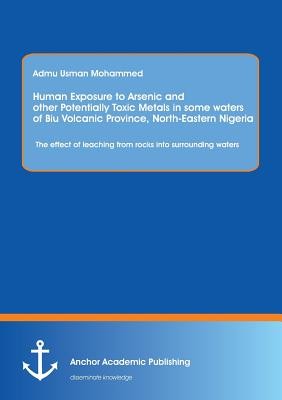
- We will send in 10–14 business days.
- Author: Admu Usman Mohammed
- Publisher: Anchor Academic Publishing
- Year: 2014
- Pages: 116
- ISBN-10: 395489176X
- ISBN-13: 9783954891764
- Format: 14.8 x 21 x 0.7 cm, softcover
- Language: English
- SAVE -10% with code: EXTRA
Human Exposure to Arsenic and Other Potentially Toxic Metals in Some Waters of Biu Volcanic Province, North-Eastern Nigeria (e-book) (used book) | bookbook.eu
Reviews
Description
The Biu Volcanic Province is one of the largest Volcanic Provinces in Nigeria covering an area of 5000 km2 with a thickness of 250m. Geochemical analysis of the volcanic soil revealed the complete leaching of the major elements (CaO, K2O, MgO, MnO, and TiO2) from the surface soil probably into water sources. This may explain the extremely high Ca and K levels especially in the stream water where they display values of 348mg/l and 36 mg/l as against 200mg/l to 12 mg/l respectively of WHO admissible limits for drinking water. The accumulation of transition metals in the soil (Co 84-111ppm; Cr: 230-441ppm); Ni: 169-237ppm) is geogenic derived from the weathering of the host basaltic rock. Cr, Ni, and Cu do not easily form soluble ions in solution explaining why they display lower levels below their respective WHO admissible limits for drinking water. The absence in the soil profile and the extremely higher values of potentially harmful elements (PHEs) (As, Se, Sb, and Pb) in the spring and stream water as opposed to the lower values in the wells and borehole water suggest their extreme solubility, direct leaching and transportation of these elements from the surrounding rocks into the surface water, which may be source of exposure to the inhabitants.
EXTRA 10 % discount with code: EXTRA
The promotion ends in 19d.18:01:10
The discount code is valid when purchasing from 10 €. Discounts do not stack.
- Author: Admu Usman Mohammed
- Publisher: Anchor Academic Publishing
- Year: 2014
- Pages: 116
- ISBN-10: 395489176X
- ISBN-13: 9783954891764
- Format: 14.8 x 21 x 0.7 cm, softcover
- Language: English English
The Biu Volcanic Province is one of the largest Volcanic Provinces in Nigeria covering an area of 5000 km2 with a thickness of 250m. Geochemical analysis of the volcanic soil revealed the complete leaching of the major elements (CaO, K2O, MgO, MnO, and TiO2) from the surface soil probably into water sources. This may explain the extremely high Ca and K levels especially in the stream water where they display values of 348mg/l and 36 mg/l as against 200mg/l to 12 mg/l respectively of WHO admissible limits for drinking water. The accumulation of transition metals in the soil (Co 84-111ppm; Cr: 230-441ppm); Ni: 169-237ppm) is geogenic derived from the weathering of the host basaltic rock. Cr, Ni, and Cu do not easily form soluble ions in solution explaining why they display lower levels below their respective WHO admissible limits for drinking water. The absence in the soil profile and the extremely higher values of potentially harmful elements (PHEs) (As, Se, Sb, and Pb) in the spring and stream water as opposed to the lower values in the wells and borehole water suggest their extreme solubility, direct leaching and transportation of these elements from the surrounding rocks into the surface water, which may be source of exposure to the inhabitants.


Reviews